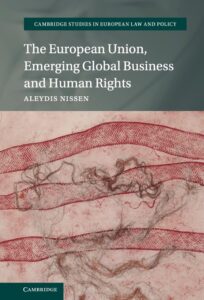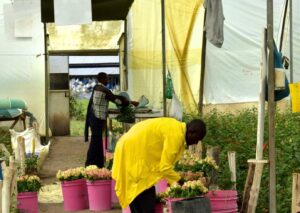Aleydis Nissen
In June 2017, I followed the Socio-Legal Residential Masterclass on the politics of socio-legal scholarship. Five months later, it was time to put those insights in practice and to find out for myself what the ‘“cracks and dysfunctions” in existing legal systems’ are. These insights will be published by Cambridge University Press in my monograph ‘The European Union, Emerging Global Business and Human Rights’ later this month.

Figure 1 – Cover of the book
Research gap that is filled
My monograph is – as indicated by the title – situated in the field of ‘business and human rights’. This field – which has been around for almost five decades has, to date, largely overlooked private transnational corporations from developing and emerging states (TNC-DECs). If TNC-DECs are included in the literature, then they are mostly studied in supply chain relations, as subsidiaries of corporations from European Union Member States and other economically developed states. While human rights researchers have focused on the growing influence of corporate non-state actors, they have largely overlooked the rising influence of new – and currently particularly Asian – corporate non-state actors on the global stage. Stemming from the hypothesis that the European Union intends to play a central role, I explore how the European Union and its Member States attempt to ensure that European Union-based businesses are not undercut by emerging competition.
Scope and structure
This monograph studies mandatory measures, as voluntary measures are not often perceived as a competitive threat. Sigrun Skogly and Philippa Osim helpfully explain that state obligations to protect consist of two separate stages in the ‘business and human rights context’. First, there is regulation ‘to prevent individuals from suffering human rights abuses by the actions or omissions of other private parties’. Second, there are ‘effective remedies that are available to individuals who have suffered from abuse by third parties’.
To study regulation and remediation, the monograph works between various perspectives. The first part of this monograph (Chapter 2) considers the international perspective. The second part (Chapters 3–5) considers the supranational perspective of the EU and the national perspectives of the two most pro-active EU Member States, France and the Netherlands. These analyses feed into the third part (Chapters 6–7), which investigates whether the European Union exercises global regulatory influence in selected developing and emerging states via bi- and plurilateral trade agreements and participation in transnational regulatory networks. It is well known that the European Union systematically negotiates human rights obligations through such agreements. The monograph furthermore investigates what contribution the European Union can make to the development of remedies locally, in the places where European Union-based corporations and local TNC-DECs violate human rights.
Case study research
Such an investigation requires a contextual analysis of the extent to which people in developing and emerging states are able to access remediation when they allege that their human rights have been violated by TNC-DECs. To put a spotlight on social forces that impede the enjoyment of rights, I used case studies. As Carolien Jacobs and I discuss in more detail here, case study research is well suited to shedding empirical light on contemporary phenomena including legal systems within their real-world context.
I decided to carry out case studies in the Kenyan floriculture and South Korean electronics industries because – as I explain in more detail in the monograph – these studies seamlessly complement the French and Dutch studies in Chapters 4 and 5. I determined the categories of participants to be interviewed with the help of the ‘access to justice assessment tool’ of the American Bar Association. I identified lawyers, trade union representatives, representatives of local and international NGOs, labour officers, government officials and dispute settlers with expert knowledge as relevant.
The participants were recruited via a combination of e-mails, phone calls and personal approaches. The recruitment procedures depended largely on the context. For example, valuable connections were made at a candle light protest against the release out of prison of Lee Jae-yong, heir to the Samsung Electronics empire. This mode of political participation emerged in recent years through internet activism. Former Special Rapporteur on the rights to freedom of peaceful assembly and of association Maina Kiai lauded South Korean people for coming together peacefully and taking to the streets or halls of power to speak their minds and effect change in a peaceful manner. In Kenya, however, public gatherings were actively avoided. At the time of the research, the re-election of Kenya’s president Uhuru Kenyatta had not been recognized by his opponent Raila Odinga. The country was divided the public in confrontational “for” and “against” groups.

Figure 2 – Candle light protest against Lee Jae-yong’s release out of prison (Seoul, January 2018). In October 2022, Lee was named as the executive chairperson of Samsung Electronics.
Offering as much flexibility as possible in organising the location and conduct of interviews is vital for getting access and empower participants that their participation in the research process was entirely voluntarily and on their own terms. Most participants in South Korea indicated that it was the most convenient to do interviews in or close to their offices. They often preferred to have interviews on Sundays or bank holidays. This is not surprising, as the 68-hour workweek was still in place at the time of my field research. The majority of participants in Kenya indicated that they preferred to answer questions outside their occupational setting. They proposed locations such as a church, a branch of a coffee chain far away from their office. I arrived 40 minutes early at these pubic locations in check whether confidentially could be guaranteed and a private conversation could be held. The saturation point was reached after interviewing fourteen experts in Kenya and ten experts in South Korea.

Figure 3 – Flower farm in Isinya (December 2017).
Three innovations
Three innovations that happened ‘behind the scenes’ are not discussed in my monograph. I have, however, found other ways to share these insights with the socio-legal community.
To begin, I integrated ‘thought experiments’ in the interviews. As I explain in my contribution to the Leiden Law Methods Portal, thought experiments are widely used in various disciplines, but remain relatively invisible in the legal domain. I discovered that they can be highly useful in the socio-legal interview setting. When participants imagine and integrate conditions in a coherent and comprehensive thought experiment, they can enrich our understanding of normative arguments developed in ‘law in the books’. I ensured the internal validity of the thought experiments by accounting for the following two conditions: the imagined conditions should be verisimilar and the participants should have expert knowledge. Currently, there exists no unilateral human rights regulation in the European Union that directly regulates TNC-DECs. But, I could use other unilateral regulations that have been adopted by the European Union. The model experiments looked as follows:
Are you aware of the European Union’s Aviation Directive’s impact in Kenya?
Are you aware of the European Union’s Data Regulation Framework’s impact in Korea?
follow up Do you think that a similar initiative to advance the protection and remediation of corporate human rights violations in the electronics industry / floriculture industry can work?
I discussed two more innovations in my working paper ‘Case study research in Kenya and South Korea: reflexivity and ethical dilemmas’ that was published in the European University Institute series ‘Practising reflexivity in international law working paper series’ by editors Daniel Litwin and Sophie Schietekatte. First, the Anglo-American elements of my research, which had been reinforced by my School’s Research Ethics Committee, created challenges, in particular in South Korea. Like other field researchers, I experienced that the contexts of research institutions and participants can starkly differ and may not always be attuned to each other. I found that practicing ‘positive ethics’ – an approach that was originally developed to support psychologists in their work – is useful to deal with such issues. Positive ethics encourages reflection and the identification of commonalities between overarching professional requirements and personal values and motives. Second, through practising positive ethics, I determined that participants should participate in determining whether they benefitted sufficiently of my research. While I am sure that many researchers do this in practice when considering how the benefits and burdens of research can be as fair as possible, I had not found any reflexive accounts or ethical guidelines that address this matter. Prior to entering the field, I had anticipated that participants would benefit in two ways. First, the participants would get privileged access to the insights. I asked the participants whether this would be valuable for them and learned that my work provides more insights to my Kenyan contacts than to South Korean contacts. In Kenya, information was more scattered, while the problems were less understood. The South Korean participants indicated that the South Korean case study would, mainly be valuable to them as a part of my monograph. Second, I planned to publish two essays in popular newspapers in my home country of Belgium that could increase awareness amongst consumers about the issues at hand. The content presented in these longreads can also be used by civil society organisations that wish to disseminate research results. I learned from my contacts in the field that such publication was much more appreciated in South Korea. This belief might have been strengthened by the fact that major global consumer brands were included in the South Korean case study.
Aleydis Nissen is a researcher at Leiden Law School. She also obtained two individual research grants from FWO and F.R.S.-FNRS (affiliated with the Free Universities of Brussels). The monograph website is www.emergingbhr.eu and the author website is www.aleydisnissen.com.

Leave A Comment